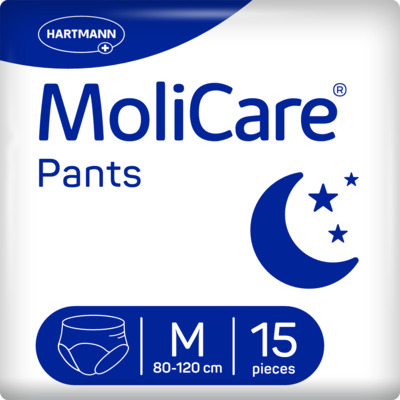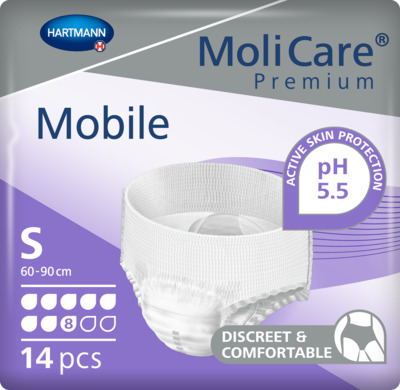Incontinence Advice
10 Possible Causes & Treatments
Why is my bladder so weak all of a sudden? Sudden urine leakage is common and frustrating. 5% of the population worldwide experiences incontinence[i]. There are several possible causes, from minor to more serious conditions. Diagnosing the cause will help you find treatment. In the below article we will discuss 10 possible causes and treatments. You can also use our incontinence pads for women to help you manage your condition.

Taking Certain Medications
Urinary incontinence or an overactive bladder can be a side effect of some prescribed medications. Certain medicines can affect the natural bodily processes of storing and releasing urine or increase the amount of urine that you produce. So, if you have recently started a new medication and are questioning ‘why am I leaking urine’, you may want to check your medicine cabinet.
Medicines that are known to affect the bladder include:
● Diuretics - a type of drug that causes the kidneys to make more urine.
● Angiotensin Converting Enzyme (ACE) inhibitors - medications that help relax the veins and arteries to lower blood pressure.
● Hormone Replacement Therapy (HRT) - is a treatment to relieve symptoms of the menopause.
● Certain antidepressants - Selective serotonin reuptake inhibitors (SSRIs) may cause urinary incontinence as a side effect, and it is seen that serotonin/noradrenaline reuptake inhibitors (SNRIs) and tricyclic antidepressants may decrease present urinary incontinence symptoms.
● Sedatives – a muscle relaxer
Neurological Conditions and Diseases
Certain neurological disorders can affect the nerves and muscles that control the bladder, leading to sudden and uncontrollable episodes of incontinence. In these cases, the neurological condition can disrupt the normal signalling between the brain and bladder, leading to bladder dysfunction.
Neurological disorders that can cause urinary incontinence include:
● Multiple sclerosis
● Parkinson's disease
● Spinal cord injury
● Brain injury
● Stroke
Treatments
Treatment for incontinence due to
neurological disorders may vary depending on the underlying cause and severity of
the condition. For example, in some cases, medication or surgery may be
necessary to address the neurological condition and improve bladder control.
However, in other cases, behavioural therapies such as bladder training or
pelvic floor exercises may be helpful in managing symptoms.
Additionally, there
are a variety of incontinence products available, such as incontinence pads or adult incontinence pants, that can provide
temporary solution and help manage symptoms. It would be best to work with your
healthcare provider to determine the best treatment plan for your specific
needs and underlying condition.
Why am I suddenly leaking urine
Blockage In The Urinary Tract
Any interference with the urinary tract can lead to a change in urine flow, which may lead to the bladder overflowing. Blockages in the urinary tract can develop over time, such as bladder or kidney stones, or more sudden issues can be caused by conditions such as benign prostatic hyperplasia or narrowing of the ureters.
Treatments
Blockages in the urinary tract and disturbed urine flow can lead to infections, so seeking treatment quickly is vital. Once the cause of the blockage has been found, there may be several treatments available to you. The most common treatments for a blockage in the urinary tract include:
· Medications
· Inserting a catheter into your bladder through the urethra
· Surgery to remove the obstruction

Incontinence Product Finder
Selecting the right products is key in ensuring security and discretion. If you’re not quite sure what you need, try our product finder. It’ll ask you a few questions about your needs and then provide a list of recommended products that may help you.
Find Product Incontinence Product FinderAn Enlarged Prostate Gland (Men Only)
In men, an enlarged prostate gland can lead to sudden episodes of incontinence. As the prostate gland grows, it can put pressure on the urethra, which is the tube that carries urine out of the body. This pressure can cause difficulty in emptying the bladder completely, leading to urine leakage or dribbling. A visit to the GP to check the prostate, they may perform an examination of the prostate by inserting a finger into the rectum, this procedure is known as a Digital Examination of the Rectum (DRE) or a simple blood test known as a Prostate-Specific Antigen (PSA), this will check the levels within the prostate.
Treatments
Treatment for urinary incontinence due to an enlarged prostate gland may include medications to shrink the prostate or surgery to remove the gland. Bladder training or pelvic floor exercises may also be helpful in managing symptoms. In some cases, a combination of treatment options may be necessary to effectively manage symptoms and improve bladder control.
Weak Bladder Muscles
The muscles in the bladder play an important role in controlling the flow of urine. However, several factors can weaken the bladder muscles, such as ageing, pregnancy, childbirth, or certain medical conditions such as Diabetes or Multiple Sclerosis (MS). Weak bladder muscles can cause urine to leak out unexpectedly, leading to sudden episodes of urinary incontinence.
Treatments
Treatment for weak bladder muscles may include pelvic floor exercises, also known as Kegel exercises, which can help strengthen the muscles that control the bladder. Behavioural therapies such as bladder training can also be effective in managing symptoms. If bladder weakness is caused by an underlying medical condition, medication or surgery may be necessary to address the issue.
Diabetes
Diabetes can cause damage to the nerves that control the bladder muscles and the sensation of fullness in the bladder. As a result, people with diabetes can develop a condition called Diabetic Neuropathy, which can cause the bladder to empty too frequently or too slowly, leading to urine leakage or incontinence.
Treatments
Treatment for leaking urine due to diabetes may include medications to control blood sugar levels and manage symptoms of diabetic neuropathy. Depending on your symptoms, you may also find bladder training or pelvic floor exercises helpful.

Incontinence Product Finder
Selecting the right products is key in ensuring security and discretion. If you’re not quite sure what you need, try our product finder. It’ll ask you a few questions about your needs and then provide a list of recommended products that may help you.
Find Product Incontinence Product FinderStress
Stress can be a major factor in those wondering ‘why do I leak urine’. When the body is under stress, the muscles that control the bladder can become tense, leading to an increased urge to urinate. Chronic stress can also weaken the pelvic floor muscles, making it difficult to hold urine in the bladder.
Treatments
The best treatment for stress incontinence is often pelvic floor training, as regular exercises help to keep the muscles of your bladder in a stable position. However, there are other treatment options that your healthcare provider may recommend. For example, some people find that biofeedback and bladder training are effective for them. On the other hand, doctors may prescribe medication to help relax the bladder or reduce the frequency of urination.
Read more on stress incontinence
Diet
What you eat can have some serious effects on the bladder, with certain foods irritating the bladder or acting as diuretics, increasing urine production and frequency. Spicy or acidic foods, caffeine, alcohol, and artificial sweeteners are common culprits. Additionally, constipation caused by a diet low in fibre can put pressure on the bladder and increase the risk of urinary incontinence.
Treatments
To treat urinary incontinence related to diet, your doctor will likely recommend healthy dietary changes to make and the avoidance of irritants and increase fibre intake to prevent constipation. Some people may also benefit from pelvic floor exercises or biofeedback therapy to strengthen the muscles that control urination.
Excess Body Weight
Excess body weight or obesity is another possible cause of urinary incontinence. The excess weight puts pressure on the bladder and pelvic muscles, weakening them and reducing their ability to control the flow of urine. In women, obesity can also lead to a weakening of the muscles in the pelvic floor, which can contribute to urinary incontinence.
Treatments
Weight loss is the most effective treatment for urinary incontinence related to excess body weight. Losing weight can help reduce pressure on the bladder and pelvic muscles, which can improve urinary control. Studies have shown that even a modest weight loss of 5-10% can significantly improve urinary incontinence symptoms[iii]. In addition to weight loss, pelvic floor exercises can help strengthen the muscles that control urine flow if you are leaking urine due to excess weight.

Incontinence Product Finder
Selecting the right products is key in ensuring security and discretion. If you’re not quite sure what you need, try our product finder. It’ll ask you a few questions about your needs and then provide a list of recommended products that may help you.
Find Product Incontinence Product FinderProstate Cancer
Prostate cancer is a type of cancer that affects the prostate gland, a small gland in men that produces seminal fluid. The prostate gland surrounds the urethra, the tube that carries urine from the bladder out of the body. As a result, prostate cancer can cause urinary problems, including incontinence or the involuntary leakage of urine. This can occur due to the prostate gland pressing against the urethra, as well as damage to the urinary sphincter muscles that control the flow of urine. Although prostate cancer can cause incontinence, it’s vital to talk to a doctor to determine the root cause if you start leaking urine, as there are several other causes that could be behind your symptoms. However, with 1 in 8 men being diagnosed with prostate cancer[ii], catching it early is vital.
Treatments
Management options for incontinence related to prostate cancer may include pelvic floor exercises, medications, or surgery. However, when it comes to treating prostate cancer, you will likely have to undergo surgery or radiation therapy. Unfortunately, incontinence is also a side effect of these treatments, so it’s important to discuss the potential side effects with your doctor.
Determine The Cause Behind Urinary Incontinence and Get The Right Treatment
Sudden episodes of urinary incontinence can be distressing to experience, but it’s important to remember that this is not an uncommon problem. By seeking medical advice, those experiencing sudden episodes of leaking urine can receive a proper diagnosis and effective treatment. Fortunately, with the right approach, it is possible to manage this condition and regain control of your bladder. So, if you are wondering "why am I leaking urine”, know that you are not alone, and this condition doesn’t have to last forever.
Read More: Causes of Urinary Incontinence
FAQs
Is It Normal For Adults To be Incontinent?
No, it is not normal for adults to be incontinent, or leak urine. Although it may occasionally occur in adults, particularly as they age, it is not a normal or healthy condition. There are several causes of urinary incontinence, however there are plenty of treatments too. It's important to speak with a healthcare professional if you are experiencing symptoms of urinary incontinence to determine the underlying cause and receive appropriate treatment.
Why Can't I Hold My Pee All Of A Sudden?
If you are suddenly struggling to control your bladder and are unconsciously peeing yourself, there can be several causes. For example, you may have weak pelvic floor muscles, a neurological disorder, side effects from medications or a UTI. To determine the cause of your symptoms, you should discuss them with a doctor.
What Are The First Signs Of Incontinence?
The first signs of urinary incontinence can vary depending on the type and severity of the condition, but some common signs to look out for include:
● Urinary urgency: A sudden and strong urge to urinate that may be difficult to control.
● Urinary frequency: The need to urinate more often than usual, even if you haven't consumed large amounts of fluids.
● Urinary leakage: Unintentional leakage of urine, which can range from small amounts to a complete loss of bladder control.
● Nocturia: The need to wake up during the night to urinate.
● Difficulty emptying the bladder: Straining or taking a long time to empty the bladder fully.
Sources
[i]Incontinence.co.uk. (2021). What percentage of the
population are affected by incontinence? [online] Available at:
https://www.incontinence.co.uk/what-percentage-of-the-population-are-affected-by-incontinence [Accessed 13 Apr. 2023].
[ii]Hunskaar, S., Lose, G. and Sykes, D. (2004). The
prevalence of urinary incontinence in women in four European countries. BJU
International, 93(3), pp.324-330. [online] Available at: https://www.ncbi.nlm.nih.gov/pmc/articles/PMC3038422/
[iii]Prostate Cancer UK. (2022). About prostate cancer.
[online] Available at:
https://prostatecanceruk.org/prostate-information/about-prostate-cancer [Accessed 13 Apr. 2023].

MoliCare® Premium Mobile 5 Drops
<h2>MoliCare Premium Mobile 5 Drops: The Solution for Incontinence</h2> <p>Experience the ultimate solution for managing moderate to very severe incontinence with MoliCare® Premium Mobile 5 Drop incontinence pants. These innovative pull-on pants provide the look and feel of ordinary underwear, ensuring discreetness and exceptional protection.</p> <p>With your comfort and security in mind, the discreet and adaptable design of MoliCare® Premium Mobile pants conforms to the shape of your body.</p> <p>The pH-balanced formulation ensures effective skin protection, preserving the natural balance and health of your skin. Featuring a three-layer absorbent core, these pants lock away urine, providing dryness and ensuring you stay comfortable and confident. The anti-leakage system offers extra security and protection, preventing any leaks or accidents. Odour neutralisers are added to provide long-lasting freshness and confidence, eliminating unwanted odours.</p> <h2>High Absorption Capabilities</h2> <p>MoliCare® Premium Mobile 5 Drop pants provide superior absorption capabilities, making them the perfect choice for managing moderate incontinence. With varying levels of absorbencies available, you can choose the one that suits your specific needs. The breathable fabric, anatomical shape, and absorbent core keep moisture away from your body, keeping your skin dry. Enjoy the convenience of easy removal with the quick tear-open sides of MoliCare® Premium Mobile pants, which is even suitable for those with severe bladder weakness!</p> <h2>Choosing your Size</h2> <p>Measure waist at the largest width between the waist and hips. Select the product size based on the below sizing.</p> <p>Small: 24-35 inches (60-90cm)</p> <p>Medium: 31-47 inches (80-120cm)</p> <p>Large: 39-59 inches (100-150cm)</p> <p>Extra Large: 51-67 inches (130-170cm)</p> <p>Fast, reliable delivery service for all your essential <a href="https://www.hartmanndirect.co.uk/" style="color:#0563c1; text-decoration:underline">HARTMANN Direct</a> incontinence products straight to your door. Take advantage of our convenient online ordering system and benefit from our price match promise, along with free delivery on orders over £50. Our friendly customer service team is here to assist you in selecting the right product for your needs.</p> <p> </p>
MoliCare® Premium Mobile 6 Drops
<h2>Discreet and comfort</h2> <p>Say goodbye to worries about unpleasant odours. Our Premium Mobile 6 drop incontinence pants are equipped with odour neutralisers, ensuring long-lasting freshness and confidence, so you can go about your daily activities with assurance.</p> <p>Experience superior absorption with our pull-on disposable pants in Premium Mobile 6 drop, which serve as a reliable and convenient solution for managing moderate to very severe incontinence. The discreet underwear-style fit offers you the freedom and flexibility you desire, while delivering unmatched dryness and comfort.</p> <p>Crafted from breathable fabric, the anatomical shape and three-layered absorbent core effectively keep moisture away from your body, ensuring a calm and dry sensation for your skin. The two-part cuffs act as a powerful shield against leakage, while the odour neutralisers keep any unwanted odours at bay, allowing you to live your life to the fullest.</p> <p>Removing the pants is a breeze, thanks to the quick tear-open sides, making them easier to use and convenient. Rest assured, our Premium Mobile 6 drop pants are effective even for very severe bladder weakness, providing the utmost protection you need.</p> <h2>Choosing your Size</h2> <p>Measure waist at the largest width between the waist and hips. Select the product size based on the below sizing.</p> <ul> <li>Extra Small: 18-28 inches (45-70cm)</li> <li>Small: 24-35 inches (60-90cm)</li> <li>Medium: 31-47 inches (80-120cm)</li> <li>Large: 39-59 inches (100-150cm)</li> <li>Extra Large: 51-67 inches (130-170cm)</li> </ul> <p>For further assistance, do not hesitate to contact our team today at 0800 028 9470, and be sure to order your MoliCare Premium Mobile 6 drop pants today.</p>
MoliCare Pants for Night
<h2>Incontinence pants for protection at night </h2> <p>Don’t let incontinence disturb your sleep. MoliCare® Pants Night is the simple and affordable solution for reliable protection at night. </p> <p>MoliCare® Pants Night incontinence pants for adults, also known as pull up panties, are worn like regular underwear and are available in sizes M and L. The absorbent core inside the incontinence pants quickly traps urine and ensures a pleasantly dry feeling on the skin even during the longer wear time at night. </p> <p>MoliCare® Pants Night help to keep intimate skin healthy by maintaining its natural pH value. At the same time, the absorbent core neutralises unpleasant odours. Soft and close-fitting double cuffs at the leg openings also prevent leakage. </p> <p>MoliCare® Pants Night are designed for reliable protection at night. You can recognise the nighttime incontinence pants by the moon on the packaging. They complement MoliCare® Pants Day incontinence pants which provide discreet protection during the day. </p> <h2>Who are MoliCare® Pants Night suitable for? </h2> <p>MoliCare® Pants Night are suitable for women and men with moderate incontinence who are looking for a reliable solution for the night. They lose up to 200 ml of urine at night and cannot always reach the toilet in time. <br /> <br /> They can go to the toilet independently or with a little help. MoliCare® Pants Night are suitable for urge incontinence. </p> <p>Highest wearing comfort and still affordable: MoliCare® Pants Night </p> <p>Thanks to fast absorption and odour-control, the incontinence pants provide reliable, comfortable protection while you sleep. MoliCare® Pants Night are extremely comfortable to wear. The soft, noiseless material means you will hardly notice the difference to regular underwear. </p> <p>MoliCare® nighttime incontinence pants are very skin-friendly. The slightly acidic pH value in the intimate area protects the skin from external contaminants such as urine. MoliCare® Pants Night help to maintain this natural pH value and protect the skin. </p> <p>You usually need no more than two MoliCare® Pants Day inco pants during the day and one pair of MoliCare® Pants Night incontinence pants for the night. This gives you a low cost yet high-quality round-the-clock supply of incontinence pants from HARTMANN Direct. </p> <h2>We are HARTMANN </h2> <p>MoliCare® is HARTMANN’s extensive range of continence care products. For over 40 years, we have been developing effective, reliable products that help people manage the challenges of living with incontinence. Our aim is to provide the right solution for every need. </p> <h2>Choosing your Size</h2> <p>Measure the waist at the largest width between the waist and hips and select the product size.</p> <p>Medium: 31-47 inches (80 – 120cm)</p> <p>Large: 39-59 inches (100-150cm)</p> <p> </p> <h2>Delivery service</h2> <p>Fast, reliable delivery service for all your essential <a href="https://www.hartmanndirect.co.uk/">HARTMANN Direct</a> incontinence products straight to your door. Take advantage of our convenient online ordering system and benefit from our price match promise, along with free delivery on orders over £50. </p> <p><strong>Need more help?</strong> Our friendly customer service team are waiting to help you choose the right product – call 0800 028 9470.</p>
